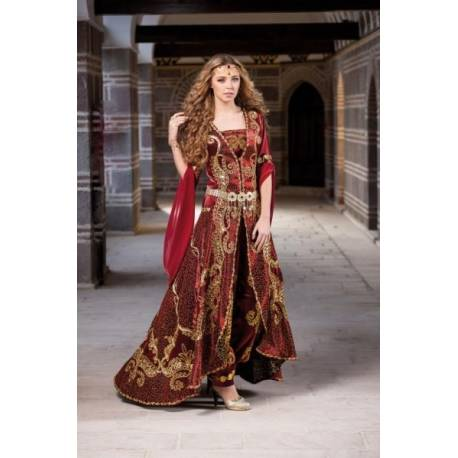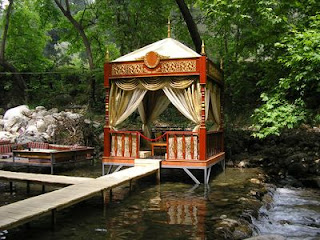A bandit raid has left Rose in urgent need of help.
Kerim Pasha takes one look at her, and is very eager to help.
I am indebted to Richard Blake author of the Aelric Series - books described as 'Nasty, fun and educational.' - for this fun review of
When I was a boy, the local library refused to give adult tickets to anyone under the age of twelve. My grandmother came to the rescue by lending me hers. In exchange for being able to borrow all the moderately wicked stuff I could lay hands on, I only had to keep her fed with romantic fiction. Being a conscientious boy, I made sure to read everything before borrowing it for her. This gave me a taste for romantic fiction – especially historical romantic fiction – that has never entirely left me.
Therefore, I enjoyed the first chapter of Beth Elliott’s April and May. We are at a ball in London in 1799. Rose Graham is young and silly and in love with dashing Tom Hawkesleigh. He, of course, has designs on her that are not wholly honourable. He takes her into a quiet room and makes an advance she is more than inclined to welcome.
Sadly –
“How dare you conduct yourselves in such a disgusting manner?”
Her sister-in-law Augusta has caught them just in time. Tom is ejected in disgrace. Rose is told she will never see him again:
“After such a disgrace, that is impossible. You cannot be trusted, and he is only a younger son.”
Not a bad opening, and I expected the next chapter to move to Bath, with a foppish Lord or two and a villainous rake. Instead, however, we move straight to 1804, and are in Constantinople. Tom is a senior intelligence officer at the Embassy there. He is deep in negotiations with Kerim Pasha, who wants British help to modernise the Ottoman armed forces. Everything must take place in secret. Though some kind of modernisation is essential if the Empire is not to be pulled apart, the forces of conservatism are strong in Constantinople. Worse, the French still have ambitions in the Near East, and will do anything to stop an agreement with Britain.
Into this comes Rose – now Rose Charteris, but a widow. She had been in Egypt with some relatives, trying to make sense of the hieroglyphs. A bandit raid has left her in urgent need of help. Kerim Pasha takes one look at her, and is very eager to help. Tom is jealous and protective, but uncertain of his own continuing feelings.
From here, we move back to London, where the cast reassembles for what becomes a tight thriller – high politics, deception, attempted abduction, attempted murder. If you want to know more, I suggest you should find out for yourself.
What did I enjoy about this novel? I have mentioned the plot already. But there is also a talent for describing places. My imagination has been filled for over a decade now with Constantinople, and I go to Turkey every year. In the relevant chapters of this book, I could smell the City and feel the warm bath of its climate. London is unexpectedly dark and mysterious. The sub-plot about the Egyptian hieroglyphs is convincing. This is primarily a romantic novel, and, if that is what you like, you will find everything you want. At the same time, it has touches of Patrick O’Brien and a steely quality that should make it of general interest.
My only complaint is that I am not aware of a sequel. The politics alone make the story worth continuing – perhaps a trip to Egypt and a chase by French agents beside the pyramids. Also, if sketchily drawn, some of the characters are worth developing – Lady Westacote, for example. If I found Max a little dull, he would make a good murder victim in the ruins of Ephesus. Even horrid Augusta has potential. She could be abducted in Cairo by Bedouins, and go native in someone’s harem.
And so, my overall judgement is – give us more. A writer’s fictional world is like a child. If you go to the trouble of creating one – and doing it as well as Beth Elliott has done – you are only at the beginning of your duty. The closing kiss should not be the end of this story.



























